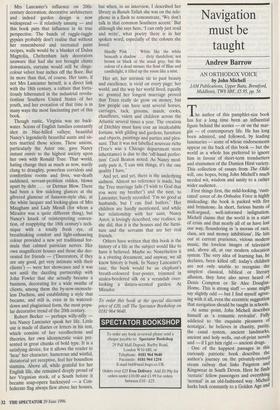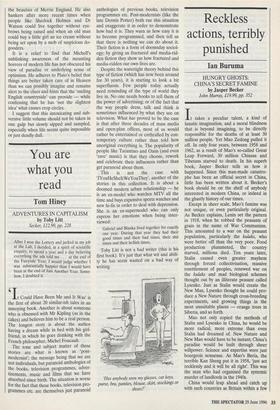Navigation must be taught
Andrew Barrow
The author of this pamphlet-size book has for a long time been an influential figure behind the scenes — or on the mar- gin — of contemporary life. He has long been admired, and followed, by leading luminaries — some of whose endorsements appear on the back of this book — but the world as a whole has preferred to ignore him in favour of short-term trendsetters and stuntsmen of the Damien Hirst variety. This collection of essays from The Oldie will, one hopes, bring John Michell's much needed wit, wisdom and sanity to a rather wider audience.
First things first, the mild-looking, 'rusti- cated' cover of An Orthodox Voice is highly misleading: the book is packed with fire and brimstone. In short, furious bursts of well-argued, well-informed indignation, Michell claims that the world is in a state of crisis and that nearly all of us have lost our way, floundering in 'a morass of race, class, sex and money inhibitions'. He hits out at current prurience, vicious modern music, the loveless images of television and, above all, at our modern education system. The very idea of learning has, he declares, been killed off: today's children are not only unable to recognise the simplest classical, biblical or literary allusion, they have also never heard of Denis Compton or Sir Alec Douglas- Home. This is strong stuff — some might say slightly odd — but I find myself agree- ing with it all, even the eccentric suggestion that navigation should be taught in schools. At some point, John Michell describes himself as 'a romantic revivalist'. Fully addicted to 'the exquisite pleasures of nostalgia', he believes in chastity, purity, the canal system, ancient landmarks, ancient and holy wells, out-of-print novels and — if I get him right — ancient drugs. One of the happiest passages in this curiously patriotic book describes the author's journey on the privately-revived steam railway that links Paignton and Kingswear in South Devon. Here he finds `ecstatic' fellow passengers and everything `normal' in an old-fashioned way. Michell harks back constantly to a Golden Age and the beauties of Merrie England. He also hankers after more recent times when people like Sherlock Holmes and Dr Watson could live together without eye- brows being raised and when an old man could buy a little girl an ice cream without being set upon by a mob of suspicious do- gooders.
It is a relief to find that Michell's unblinking awareness of the mounting horrors of modern life has not obscured his view of paradise or underlying sense of optimism. He adheres to Plato's belief that things are better taken care of in Heaven than we can possibly imagine and remains alert to the clues and hints that the 'smiling English countryside' can provide — while confessing that he has 'not the slightest idea' what causes crop circles.
I suggest that this intoxicating and sub- versive little volume should not be taken in one gulp but slowly sipped and sampled, especially when life seems quite impossible or just deadly dull.



























































 Previous page
Previous page